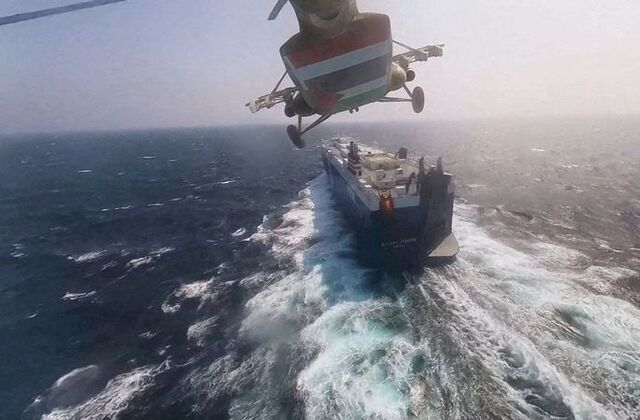Last night, the United States military fired its fourth wave of missile strikes on Houthi-occupied sites in Yemen, indicating a clear continuation of mounting international tension in the wake of the Israel-Palestine conflict.
The Houthis, an Iran-backed group that controls most of Yemen, have been attacking ships in the Red Sea region since November to obstruct trade between Europe and Asia, claiming to be acting in solidarity with Palestinians. These assaults have been a cause for panic among many major powers, including the US, prompting sanctions and missile strikes.
The attack coordinated by the Houthis on Wednesday involved a drone setting a carrier ablaze, prompting the US to launch retaliatory missiles. The Houthis likely felt compelled to strike after being designated as a Specially Designated Global Terrorist (SDGT) entity by the Biden administration just a day prior. The United Kingdom has since joined the US in taking military action against the Houthis, citing such military action as a “necessary and proportionate response to a direct threat to UK vessels and therefore to the UK itself,” as articulated by Prime Minister Rishi Sunak earlier this week.
The effects of the military escalation in the Red Sea, a quasi proxy war in its own right, are beginning to plunge into humanitarian organizations working in the region. Inherently, the security threat brought on by missile strikes and drone attacks means higher prices and shipping delays. This can be detrimental to delivering proper aid in a timely manner, especially given that 21.6 million Yemenis, or two-thirds of the population, are in dire need of humanitarian assistance and protection services, according to the United Nations.
But despite the consequences of impeding commercial shipping, Houthi leaders are all but ready to relent. In a televised speech last week, Houthi leader Abdul Malik al-Houthi said that “direct confrontation with the American, British and Israeli is what [the Houthis] yearn for.” Ostensibly speaking, unless Israel announces a cease-fire — an end to the “Israeli aggression” in Gaza, as Houthi leaders would put it — the Houthis will persist in attacking ships in the Red Sea.
The animosity between the US and the Houthis is by no means a new development. Since 2002, the US has carried out nearly 400 strikes in Yemen. But since 2015, the US has directly opposed the Houthis in specific after jumping to the defense of Saudi Arabia. Most Saudis and Houthis already are traditional enemies, given that the vast majority of Saudis are Sunni Muslims, while the Houthis adhere to Shiitism. These two sects of Islam have been at odds for centuries, repeatedly arousing violent conflict and contributing to instability in the Middle East. The current conflict, however, stems more directly from the Yemeni Revolution.
In 2011, the Houthis played a major role in the revolution, helping stimulate change and ultimately leading to a transfer of power in 2014. But the Houthis, unhappy with the new leaders, decided to overtake the capital of Yemen, Sana’a, sparking a fiery civil war that rages to date. Concerned over increased communication between the Houthis and Iran, as well as an aversion to Houthi consolidation of power in Yemen, Saudi Arabia chose to go to war with the Houthis as a preventive measure. Former President Barack Obama backed the Saudis, placing the US at the forefront of the fight against the Houthis.
The political turmoil between the US and the Houthis — an otherwise somewhat well-worn tale — is more vicious than ever as the war in Gaza endures. A regional war in the Middle East now seems inevitable. This leaves the US with a critical question: Can any more be done to thwart Houthi aggression in the Red Sea?
The White House has maintained a relatively opaque stance with regard to doing more to combat the Houthis, but promised in a joint statement with allied powers last week to “defend lives and protect the free flow of commerce in one of the world’s most critical waterways in the face of continued threats.” Additionally, the aforementioned SDGT designation will take effect in 30 days, allowing the Biden administration to pointedly target the Houthis while exempting millions of Yemenis from sanctions on the basis of humanitarianism.
As armed aggression engulfs the Middle East, only time will tell whether or not the Houthis persist in their attacks in the Red Sea. Regardless, as per the White House, the US will remain steadfast in its missile-striking approach, hopefully putting an end to the Houthi front.


